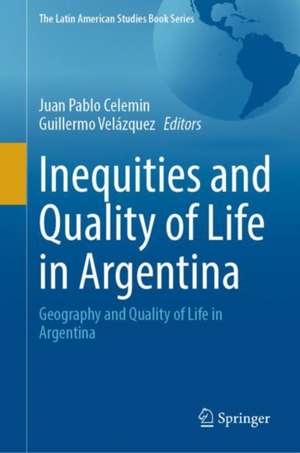Inequities and Quality of Life in Argentina: Geography and Quality of Life in Argentina: The Latin American Studies Book Series
Editat de Juan Pablo Celemin, Guillermo Velázquezen Limba Engleză Hardback – 17 mar 2022
| Toate formatele și edițiile | Preț | Express |
|---|---|---|
| Paperback (1) | 784.79 lei 6-8 săpt. | |
| Springer International Publishing – 18 mar 2023 | 784.79 lei 6-8 săpt. | |
| Hardback (1) | 793.14 lei 3-5 săpt. | |
| Springer International Publishing – 17 mar 2022 | 793.14 lei 3-5 săpt. |
Din seria The Latin American Studies Book Series
- 18%
 Preț: 726.85 lei
Preț: 726.85 lei -
 Preț: 392.97 lei
Preț: 392.97 lei - 20%
 Preț: 589.20 lei
Preț: 589.20 lei - 18%
 Preț: 891.02 lei
Preț: 891.02 lei -
 Preț: 396.02 lei
Preț: 396.02 lei - 15%
 Preț: 647.40 lei
Preț: 647.40 lei - 18%
 Preț: 1018.37 lei
Preț: 1018.37 lei - 18%
 Preț: 897.65 lei
Preț: 897.65 lei - 15%
 Preț: 526.50 lei
Preț: 526.50 lei - 18%
 Preț: 748.46 lei
Preț: 748.46 lei - 18%
 Preț: 943.43 lei
Preț: 943.43 lei - 18%
 Preț: 1008.12 lei
Preț: 1008.12 lei - 15%
 Preț: 653.14 lei
Preț: 653.14 lei - 5%
 Preț: 847.00 lei
Preț: 847.00 lei -
 Preț: 414.14 lei
Preț: 414.14 lei - 15%
 Preț: 520.77 lei
Preț: 520.77 lei - 24%
 Preț: 795.90 lei
Preț: 795.90 lei - 20%
 Preț: 574.08 lei
Preț: 574.08 lei - 20%
 Preț: 560.93 lei
Preț: 560.93 lei - 24%
 Preț: 906.18 lei
Preț: 906.18 lei - 18%
 Preț: 940.39 lei
Preț: 940.39 lei - 24%
 Preț: 783.99 lei
Preț: 783.99 lei - 15%
 Preț: 470.88 lei
Preț: 470.88 lei - 24%
 Preț: 590.40 lei
Preț: 590.40 lei - 18%
 Preț: 890.23 lei
Preț: 890.23 lei - 20%
 Preț: 581.64 lei
Preț: 581.64 lei - 20%
 Preț: 566.19 lei
Preț: 566.19 lei - 15%
 Preț: 635.47 lei
Preț: 635.47 lei - 24%
 Preț: 648.81 lei
Preț: 648.81 lei -
 Preț: 368.39 lei
Preț: 368.39 lei - 20%
 Preț: 574.08 lei
Preț: 574.08 lei - 15%
 Preț: 586.88 lei
Preț: 586.88 lei - 24%
 Preț: 794.72 lei
Preț: 794.72 lei - 24%
 Preț: 633.43 lei
Preț: 633.43 lei
Preț: 793.14 lei
Preț vechi: 967.24 lei
-18% Nou
Puncte Express: 1190
Preț estimativ în valută:
151.76€ • 158.46$ • 125.61£
151.76€ • 158.46$ • 125.61£
Carte disponibilă
Livrare economică 15-29 martie
Preluare comenzi: 021 569.72.76
Specificații
ISBN-13: 9783030944100
ISBN-10: 3030944107
Pagini: 353
Ilustrații: XVIII, 353 p. 179 illus., 172 illus. in color.
Dimensiuni: 155 x 235 mm
Greutate: 0.76 kg
Ediția:1st ed. 2022
Editura: Springer International Publishing
Colecția Springer
Seria The Latin American Studies Book Series
Locul publicării:Cham, Switzerland
ISBN-10: 3030944107
Pagini: 353
Ilustrații: XVIII, 353 p. 179 illus., 172 illus. in color.
Dimensiuni: 155 x 235 mm
Greutate: 0.76 kg
Ediția:1st ed. 2022
Editura: Springer International Publishing
Colecția Springer
Seria The Latin American Studies Book Series
Locul publicării:Cham, Switzerland
Cuprins
Chapter 1. Introduction(Guillermo Velázquez).- Chapter 2. Traditions and plurality of definitions in thinking about poverty(Fernando Manzano).- Chapter 3. A tour on poverty measurement in Argentina(Fernando Manzano).- Chapter 4. The index of human development and its variants(Juan Pablo Celemín).- Chapter 5. Argentine nutritional inequities. An agro-business, ultraprocessed food and malnutrition recipe(Luis Blacha).- Chapter 6. The spatial distribution of women’s health(Natalia Tumas).- Chapter 7. Sociodemography of obesity in Argentina at the beginning of the 21st. century(Sonia Alejandra Pou, Laura Aballay, Juliana Huergo).- Chapter 8. Socio-spatial differentials in the prevalence of lifesyles risk factors related to chronic diseases in Argentina from 2005 to 2013(Camila Niclis, Laura Rosana Aballay and Julia Becaria Coquet).- Chapter 9. Distribution of comprehensive health indicators in adolescence from the perspective of social inequities(María Dolores Román and Camila Niclis).- Chapter 10. Socio-territorial configuration of mortality by chronic deseases of greater prevalence(Sonia Pou, Camila Niclis, María del Pilar Díaz).- Chapter 11. Quality of life in the first national census (1869)(Velázquez Guillermo and Otero, Hernán).
Textul de pe ultima copertă
The basis of this proposal is the study of quality of life from an interdisciplinary perspective. This volume presents a set of contributions from different sciences that analyse the quality of life in Argentina. The contributions come from the social disciplines (Geography, Economics, Demography, History) and from the field of health (Nutrition, Medicine, Psychology) as well as the exact sciences (Statistics, Applied Mathematics). The purpose is to present various dimensions related to the well-being of the population, particularly in relation to poverty, human development, health, nutrition and morbidity.
Although there are works from different sciences associated with the object of study, they all have a geographic component based on cartography. Consequently, it is highlighted in the importance of a Geography as its territorial base allows it to study quality of life from a unique perspective where the map emerges as a fundamental descriptive tool. They are useful to diagnose the quality of life and its uneven spatial distribution, either through an index or different associated variables. Thus, the maps are fundamental to know the territorial configuration of the quality of life at the different scales of analysis, showing spatial inequalities and the areas where it is necessary to take measures to improve the population's living conditions.
Caracteristici
Interdisciplinary perspective of the study of quality of life Extensive use of maps that show the variations of the quality of life in the territory of Argentina Use of different approaches to measure quality of life and associated variables
